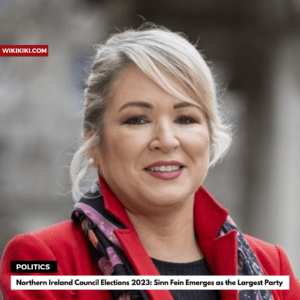Sinn Féin has emerged as the largest party in both local government and Stormont after the Northern Ireland council elections in 2023. The party gained 144 seats, an increase from the 105 council members elected in 2019. The Democratic Unionist Party (DUP) had 122 seats, and the Alliance Party finished third with 67 seats. Sinn Féin Vice President Michelle O’Neill called on the DUP to stop opposing power-sharing at Stormont. The DUP’s objection to post-Brexit trading regulations has prevented the functioning of the parliament and governing executive of Stormont.
Also Read: Greece Election 2023: Mitsotakis vs Tsipras in PM Race

Sinn Féin has secured a resounding victory in the Northern Ireland council elections of 2023, establishing itself as the largest party in both local government and Stormont. The party’s success marks a historic moment, reflecting the changing political landscape in Northern Ireland. This article examines the implications of Sinn Féin’s triumph, the challenges faced by other parties, and the potential impact on post-Brexit politics and power-sharing in the region.
The Political Landscape of Northern Ireland
The Democratic Unionist Party’s (DUP) objection to post-Brexit trading regulations has hindered the functioning of the parliament and governing executive of Stormont. Despite the DUP’s efforts to maintain its position, Sinn Féin has emerged as the dominant force in Northern Ireland’s political landscape, both at the local government and Stormont levels. This historic achievement signifies a significant shift in power dynamics and has the potential to shape the future direction of Northern Ireland’s political landscape.
Sinn Féin’s Campaign and Objectives
Sinn Féin’s campaign focused on providing positive leadership, restoring the executive, and making politics work for the people. The party aimed to address the concerns and aspirations of the electorate, highlighting the need for effective governance and representation. Their success in gaining ground in various regions, such as Coleraine, Ballymena, and Lisburn, underscores the resonance of their message and their ability to connect with voters on key issues.
Also Read: Meta is Set to Launch its Twitter-Like App by June End
Michelle O’Neill’s Call for Power-Sharing
Michelle O’Neill, Vice President of Sinn Féin, urged the Democratic Unionist Party to end their opposition to power-sharing at Stormont. By securing the largest number of seats, Sinn Féin now holds a significant mandate to advocate for a return to effective governance and collaboration. O’Neill emphasized the importance of moving beyond political stalemates and working towards a restoration of the executive, ultimately aiming to make the political system in Northern Ireland more responsive and accountable.
The Alliance Party’s Rise
The Alliance Party, a center-right party, has experienced notable gains in the council elections, emerging as the third-largest party behind Sinn Féin and the DUP. With an increase in their seat count from 52 to 67, the Alliance Party has demonstrated its growing popularity and influence among voters. This rise reflects a desire for a more moderate and cross-community approach to governance, positioning the party as a potential key player in future political negotiations.
Challenges Faced by Other Parties
While Sinn Féin’s victory is noteworthy, other parties have also experienced mixed fortunes in the council elections. The Alliance Party, a centrist party, has increased its seat count from 52 to 67, securing a third-place position. The Ulster Unionist Party (UUP) and the Social Democratic and Labour Party (SDLP) have witnessed declines in their first preference vote shares. Smaller nationalist and unionist parties have suffered significant setbacks, further consolidating the dominance of Sinn Féin and the DUP.
The DUP’s Stance on Post-Brexit Trading Regulations
The DUP, previously the largest party at Stormont, acknowledged Sinn Féin’s success but remained focused on increasing their own support base. The party’s leader, Sir Jeffrey Donaldson, emphasized the need to have a strong mandate to advocate for modifications to post-Brexit laws, ensuring Northern Ireland’s trading capabilities with the rest of the United Kingdom are protected. The DUP’s priorities lie in safeguarding Northern Ireland’s position within the union while addressing concerns about post-Brexit arrangements.
Implications for Power-Sharing and Governance
The outcome of the council elections has significant implications for power-sharing and governance in Northern Ireland. Sinn Féin’s emergence as the largest party sends a clear signal about the desire for effective and inclusive governance. It also underscores the need for the DUP to engage in constructive dialogue and collaboration, as the electorate has expressed its support for Sinn Féin’s approach to political leadership. The challenge now lies in finding common ground and ensuring that the power-sharing executive can be restored for the benefit of all communities in Northern Ireland.
Also Read: Comb Jellies is Identified as the Earth’s Oldest Animal
Future Prospects and Political Dynamics
Sinn Féin’s triumph in the council elections carries broader implications for the political dynamics in Northern Ireland. The fact that the nationalist vote now surpasses the unionist vote holds significance both politically and psychologically. It underscores the evolving demographics in the region, with Catholics now outnumbering Protestants according to recent census data. The changing landscape poses new challenges and opportunities for all parties involved.
Conclusion
Sinn Féin’s victory in the Northern Ireland council elections of 2023 signifies a significant shift in the political landscape. As the largest party in local government and Stormont, Sinn Féin’s success presents both challenges and opportunities. The party’s mandate for Irish unity and its growing influence will shape discussions on the constitutional status of Northern Ireland. Meanwhile, the DUP faces pressure to address the political impasse and find common ground with Sinn Féin.
The Alliance Party’s rise and the decline of other traditional parties highlight the electorate’s desire for stability and pragmatic solutions. The post-Brexit era adds further complexities, necessitating a resolution to the trading regulations deadlock. The restoration of power-sharing and the involvement of the British and Irish governments become crucial for effective governance and addressing the pressing issues facing Northern Ireland. As the region navigates these dynamics, the future of politics
Also Read: Italy’s Worst Flooding in 100 Years, Atleast 15,000 People Displaced

















+ There are no comments
Add yours